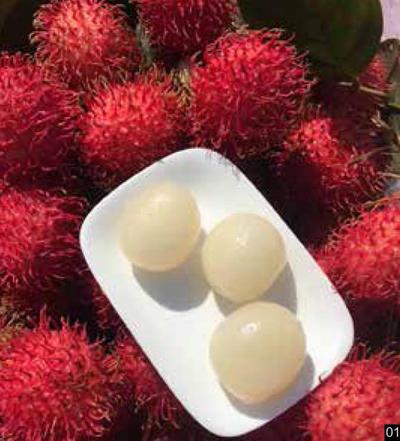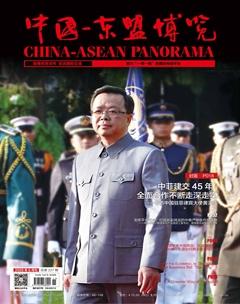Under the Epidemic, Is Thailand’s Fruit Business Still “Booming”?
Xu Junhao Chen Zhiying


In May, with the return of hot weather, Thailand fruits, such as mangosteen and durian, which are popular with Chinese consumers, entered the peak season of sales. Different from previous years, affected by the COVID-19, the fruit export of Thailand has suffered a lot. In the Chinese market, some Thai fruit wholesalers are also frowning. So, is Thailands fruit business really not “attractive”?
Is Thailands fruit business hard to do this year?
In the middle of May, the reporter visited Haijixing international logistics fruit wholesale market in Nanning, Guangxi. Under the high temperature of 35 degrees, there were still a large number of trucks entering and leaving the market, and the fruit business seemed to be as hot as ever.
However, several wholesalers doing Thailand fruit business told the reporter that this years fruit business is not so prosperous. “Affected by the epidemic, the price of goods and logistics costs have been increased.” In order to prevent and control the epidemic, trucks are not allowed to enter China. Instead, a Chinese driver waiting at the customs port will deliver the goods to different markets, thus generating an extra transportation fee. On the contrary, Thailands fruit sales are declining. Last year, selling out one container of durian took only one or two days. Now it takes at least 3 days. A “WeChat businessman” who sells Thai fruits online told the reporter that the price of fruits in Thailand is climbing this year, and the customers who are willing to spend money are basically old clients.
The response of markets will undoubtedly reflect in fruit producing areas. In fact, since the epidemic, Thai fruit has already encountered difficult problems in sales and export. According to the statistics of Thailand Customs, the value of fruits exported to China from January to February 2020 is only US$ 255 million (about RMB 1.81 billion yuan), down 23.1% year on year. Such a phenomenon has a lot to do with the obstruction of international logistics, the restriction of personnel clearance and the inhibition of market demand during the epidemic.
The main season of durian, longan and mangosteen, accounting for a large share of the export to China, is from April to September. According to Thai media, in 2020, Thailands fruit production will increase by 8.5%, and the production of durian, mangosteen, rambutan, longan and litchi will reach 3 million tons. Therefore, the logistics transportation and the demand of the Chinese market during this period are crucial for Thailands fruit export.
In response to the declining trend of export, Thailand has made efforts to sell fruit domestically. For example, the Ministry of Commerce of Thailand has cooperated with local online platforms, such as Shopee, Lazada, JD Central to promote the sales of fruit and the Ministry of Agricultural Cooperation of Thailand has launched agricultural tourism plans and agricultural products fairs to stimulate domestic fruit consumption.
Nevertheless, Thai fruit producers are optimistic about the Chinese market. Thai Association of Fresh Fruit Traders and Exporters forecasts that despite the impact of the epidemic, demand for Thai fruits in the international market, including China, remains strong, with the export value of Thai fruit growing at least 10% year-on-year in 2020.
The optimism of Thai exporters is not groundless. Some Thai fruits exported to China has shown positive signs. According to TAP, since March, the export price of durian has risen instead of falling, and there are more than 100 more fruit buyers than in 2019. In eastern Thailand, there is also a phenomenon of buyers snapping up durian. In general, the demand of the Chinese market for durian has rebounded strongly.
China and Thailand pushing for a smooth fruit trade
In 2002, the construction of China-ASEAN free trade area was launched. In October 2003, China and Thailand first implemented the “zero tariff” for fruits and vegetables. Since then, more and more Thai fruits have obtained Chinas inspection and quarantine access. The trade between China and Thailand is increasingly close. China has gradually become the main export market of Thai fruits. In 2019, Thailands exports of fresh, frozen and dried fruits to China accounted for 57.1% of total exports, generating THB 64.5 billion (RMB 14.28 billion yuan) of revenue. The import of durian, mangosteen and other fruits from Thailand also meets the increasing living needs of Chinese consumers, especially in recent years.
In face of the negative impact of the epidemic, China and Thailand are actively working together to ensure the smooth fruit trade. In April 2020, due to epidemic prevention and control, China temporarily closed some border ports, leaving only two land-based fruit entry ports of Moding in Yunnan Province and Pingxiang Friendship Pass in Guangxi Zhuang Autonomous Region, which are unable to meet the needs of Thai fruit customs clearance.
After consultation between the Ministry of Agriculture of Thailand and the General Administration of Customs of China, China agreed to open two more customs clearance ports for the import of Thai fruits in Guangxi Zhuang Autonomous Region, namely, Dongxing Port and Pingxiang Railway Port. After the implementation of the new measures, the daily cargo throughput of 2,000 tons and the efficiency of fruit entry will be ensured. At the same time, new transportation options for Thai fruit import and export will be provided to business operators: Thailands fruit containers transported by cars can be transferred to railway at Pingxiang Railway Port which transported the containers to all parts of China.
Moreover, Chinas efforts to encourage imports continue to increase. According to China News Agency, from February to April 2020, China Customs approved 588 new fruit orchards registered in 13 countries, including those in Thailand. In addition, in order to support the expansion of the import of agricultural products and food, the General Administration of Customs of China has opened up a special “green channel” at key ports, and has carried out the measure of making reservations for clearance for 24 hours, priority inspection and priority testing. These measures will be conducive to the smooth export of Thai fruits to China.
Thailand is also actively seeking cooperation with Chinese importers to expand export channels. At the end of April, the Ministry of Commerce of Thailand established an international trade promotion branch, and cooperated with cross-border E-commerce platforms such as Tmall to promote the online sales of Thai fruits. Compared with docking with Chinas import wholesalers, durian exporters in Thailand focus more on B2C (merchant to consumer) marketing through Taobao, WeChat and other channels, and provide more complete products and delivery services to achieve profit growth. Lan Zhen, founder of Thailand Taisuifeng Agricultural Development Co., Ltd., is one of the Thai fruit producers who actively use B2C to “making advertisements” for durian in Thailand. He said in an interview with TAP that in the future, the company will focus on the online market. Now there are many consumers in China who have never tasted fresh durian of Thailand, and the market potential is huge.
While the epidemic in China has been effectively alleviated, Thailands is also gradually being controlled. Coupled with the strong safeguard measures and willingness of cooperation between China and Thailand, it can be predicted that Thai fruit business will quickly resume its previous prosperity.
- 中国-东盟博览(政经版)的其它文章
- 资讯
- 简讯
- 声音
- 读图
- 中菲建交45年,全面合作不断走深走实
- “抓住今天,才能不丢失明天”

